India Indian music music: 78 rpm discs vichitra veena
by Warren
1 comment
Meta
SiteMeter
Brighter Planet
78 rpm Records of Indian Music: Ahmed Raza – Vichitra Veena
More virtuoso performances on the Hindustani equivalent of the lap slide guitar, this time from Ahmed Raza Beenkar, with Ghulam Ahmed accompanying on tabla.
Any information about Ahmed Raza will be heartily welcomed.
Raga Maru Bihag:
Thumri:
India Indian music music: genius sitar surbahar
by Warren
3 comments
Meta
SiteMeter
Brighter Planet
78 rpm Records of Indian Music: Ustad Enayet Khan
Ustad Enayet Khan is one of the most important names in Hindustani instrumental tradition, both for his own genius and for his illustrious ancestry and descendants.
Wiki:
Enayat Khan (Urdu: عنایت خان ) was one of India’s most influential sitar and surbahar players in the first decades of the 20th Century. He was the father of Vilayat Khan, one of the topmost sitariyas of the postwar period.Enayat Khan was born in Uttar Pradesh into a family of musicians.[1] His father was sitar great Imdad Khan, who taught him the sitar and surbahar (bass sitar) in the family style, known as the Imdadkhani Gharana or Etawah Gharana (school), after a village outside Agra where Imdad once lived. He married Basiran Bibi, daughter of khyal singer Bande Hussain, and settled with his family in Calcutta, where, though he only lived to 43, he did much pioneering work on the sitar. For example, he standardised its physical dimensions and added the upper resonator gourd, which is very popular with today’s players (though his own descendants have not kept using it). In a place rapidly developing into an important North Indian centre of the arts, at a time where interest in national culture was strong fuelled by the struggle for independence, he brought sitar music out from its narrow connoisseur circles to new mass audiences. Nobel laureate Rabindranath Tagore was a musical collaborator and personal friend. Some of Enayat Khan’s recordings have been released on CD, on the Great Gharanas: Imdadkhani compilation in RPG/EMI’s Chairman’s Choice series.
Enayat died young, with four children. His two sons, Vilayat and Imrat, were trained in the Imdadkhani style by other members of his extended family. Vilayat learned the sitar and Imrat the surbahar; both were to become very famous classical musicians.
Surbahar alap: Raga Purbi
Sitar Gat in Raga Bihari
India Indian music music vocalists: 78 rpm discs genius violin
by Warren
leave a comment
Meta
SiteMeter
Brighter Planet
78 rpm Records of Indian Music: Gajananrao Joshi’s Violin Virtuosity
The great Gajananrao Joshi. Both a violinist and a vocalist, he was one of the most competent and intelligent musicians of the century:
Wiki:
Joshi was a highly skilled violin player by the age of 20. His students include vocalist and violinist Madhukar Joshi, Vikas Kashalkar, Ulhas Kashalkar, Padma Talwalkar, and violinist Shridhar Parsekar. He also taught vocalists Kaushalya Manjeshwar, Shubhada Paradkar, Veena Sahasrabuddhe and Jayashree Patnekar. His daughter Malini, sons Manohar, Madhukar and Narayan are also trained musicians. His sons variously took to singing, violin, and tabla.
His grasp was so quick that it is said that Kesarbai Kerkar did not like to have him attend her concerts because he could quickly incorporate her strengths in his own singing. His gurus—father Anant Manohar Joshi of Gwalior, He was also a disciple of the late Pandit Balkrishnabau Vaze of the Gwalior Gharana Vilayat Hussein Khan of Agra and Bhurji Khan of Jaipur—spanned the three gharanas whose blend is exhibited in his art.
As the guru of my own guru, Pt. Devasthali, Gajananrao Joshi has a special place in my personal musical pantheon. Mohan Nadkarni’s biographical article on Gajananbua is well worth a read.
These two sides showcase his violin artistry, which was of a piece with his singing: intelligent, uncompromising, beautiful.
Listen and enjoy!
Raga Todi
Raga Kafi
India Indian music music: 78 rpm discs Indian folk music snake-charmers
by Warren
1 comment
Meta
SiteMeter
Brighter Planet
78 rpm Records of Indian Music: Adu Nath – Been Lahara
This disc contains two short performances by Adu Nath on the been. This “been” is not the rudra vina, but the gourd-mounted double-reed instrument commonly heard in the hands of “snake charmers” all over North India.
The two performances are simply labeled “Been Lahara.” It was obviously a tough instrument to record, as witness the distorted sound. I’m hard-pressed to imagine just who HMV’s marketing division thought was going to buy this disc. Perhaps they were going to try and market it to the tourist trade?
This disc was part of a collection of 78s I acquired serendipitously in the United States.
Anyway, enjoy. I do.
India Indian music music vocalists: 78 rpm discs naat Quawwali Urdu
by Warren
3 comments
Meta
SiteMeter
Brighter Planet
78 rpm Records of Indian Music: Bashir Quaval of Poona
Unless I miss my guess, this still from the 1936 Hindi film Miss Frontier Mail (featuring Fearless Nadia!) is of Bashir Quaval playing harmonium and singing. He is featured on some songs in the movie, and the voice certainly sounds similar to these two naat-s. See the clip here.
Since much of India’s early film industry was based in Pune, the geographical suffix makes sense.
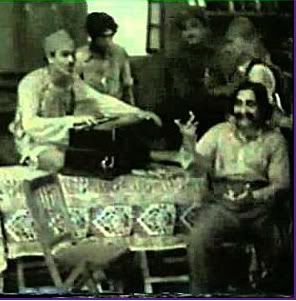
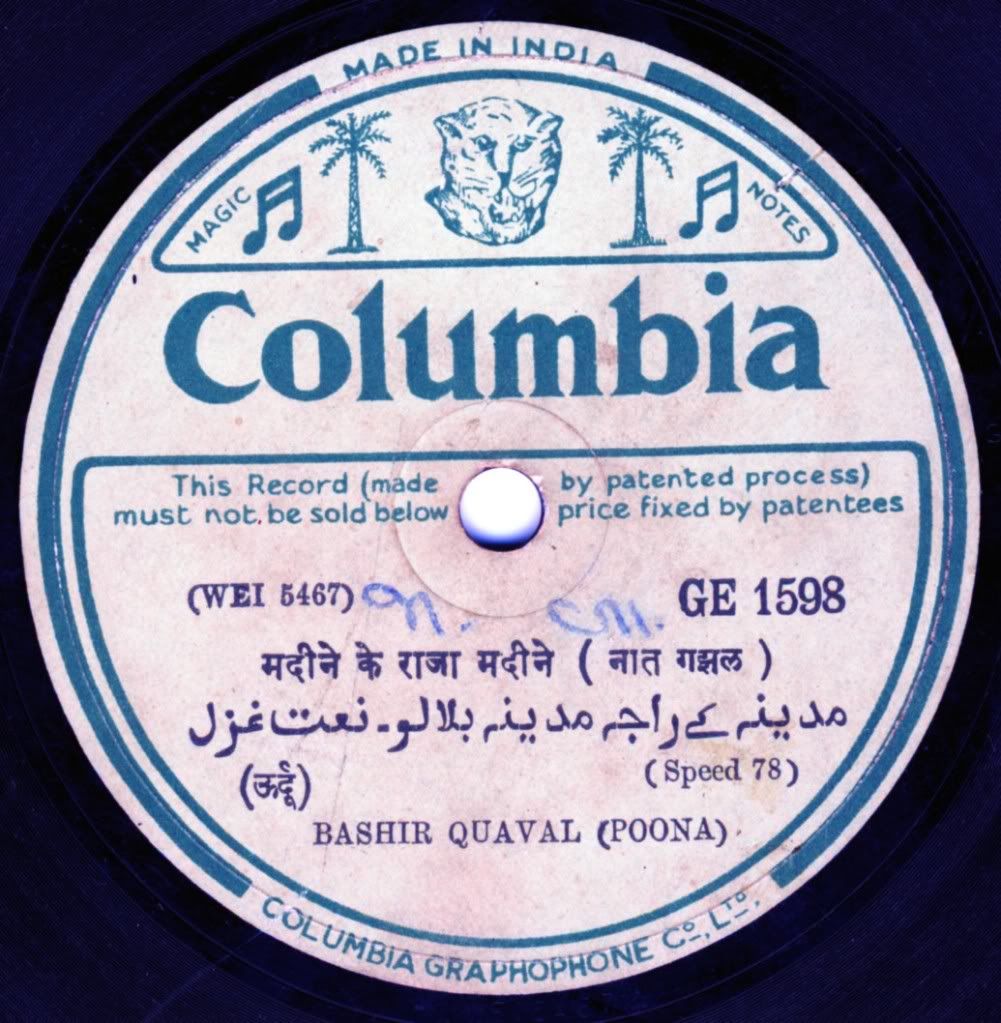
Madine ke raajaa madine
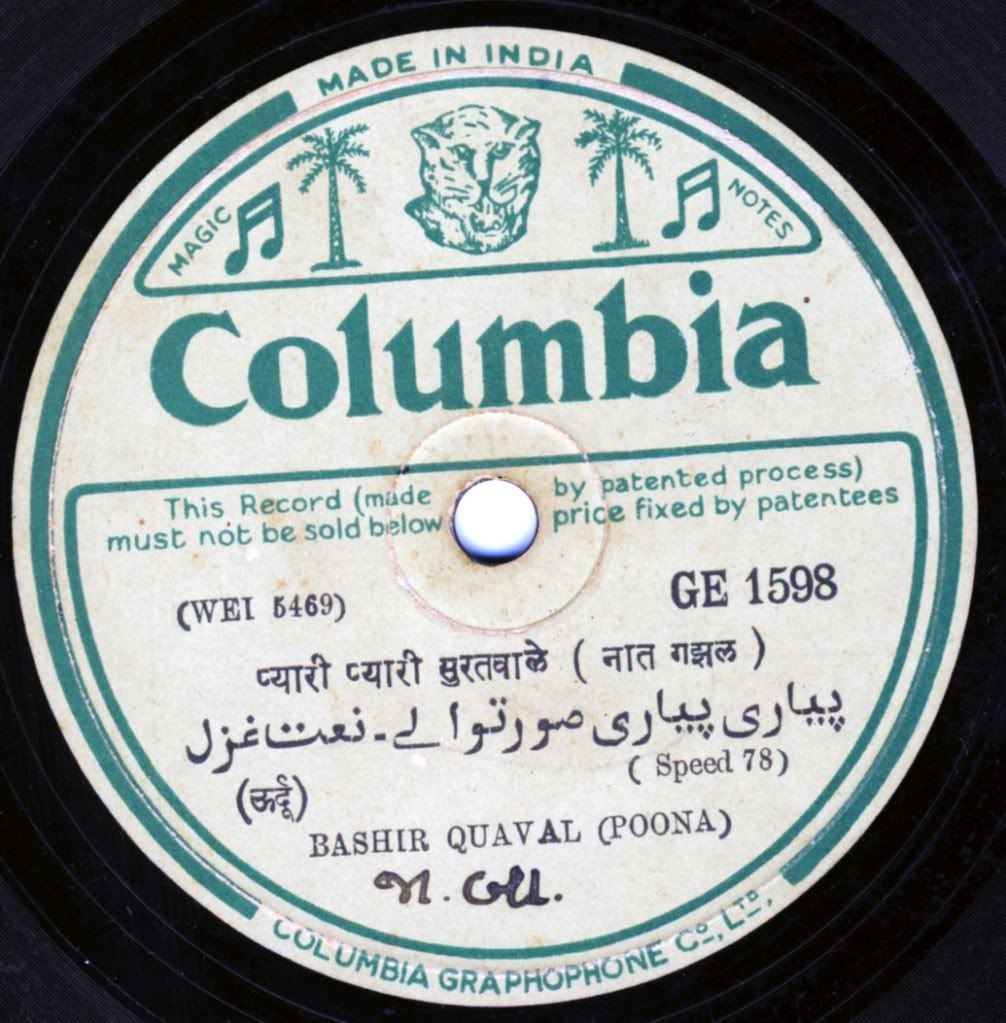
Pyaari pyaari suratwale
humor India Indian music music: 78 rpm discs novelty music
by Warren
2 comments
Meta
SiteMeter
Brighter Planet
78 rpm Records of Indian Music: V. Balsara
The keyboardist and composer V. Balsara was responsible for a great many releases of light music, including some film scores, orchestral projects and novelty recordings. These two sides present his harmonium virtuosity with ensemble accompaniment.
“Dance Tune 1”
“Dance Tune 2”
Born in June 1922, Balsara learnt music from his mother Nazamaye, and gave his first solo performance at the age of six with the pedal harmonium, in use in those times, at a packed C. J. Hall in Mumbai.
Barely ten years later, the young lad was assisting famous Music Director Ustad Mustaque Hussain, in a Bombay film production ‘Baadal’.Link
He died in 2005:
V. Balsara, synonymous with the sound of music in the city, died on Thursday afternoon. The legendary pianist and composer was 83.
Balsara, known for his versatility with an array of musical instruments, had been suffering from geriatric problems for the past few months and was undergoing treatment at his nephew’s residence in Ballygunge Park.
Chief minister Buddhadeb Bhattacharjee on Thursday expressed grief over the death of the virtuoso, who had been honoured with a D.Lit by Visva-Bharati, among a number of other awards.
{snip}
A thin, frail man, Balsara always amazed with his verve and energy and went on composing music for Bengali as well as Hindi films till the end.
Though essentially a western composer, Balsara traversed the Indian classical terrain with consummate ease.
{snip}
Balsara would often fuse eastern and western elements of music but was loath to call it fusion. “I merge pure Indian classical music with the most modern rhythms,” Balsara had told Metro during an interview at his Bowbazar house late last year. “In fact, I am allergic to the word fusion,” he had insisted.
Link
He was from all accounts a genuinely nice person and a fine musician. That said, to my compositional ears, Balsara’s work tended to the insipid:
He was not afraid to be simply silly:
Or even sillier:
India Jazz music: 78 rpm discs early jazz
by Warren
2 comments
Meta
SiteMeter
Brighter Planet
78 rpm Records of Indian Music: The Peerless Orchestra
Here are four sides on the Zonophone label from the Peerless Orchestra — a name that has apparently had a significant franchise over the years. As in the case of the Manhattan Jazz Band, these recordings were probably made in England and released in India for the benefit of the British expats.
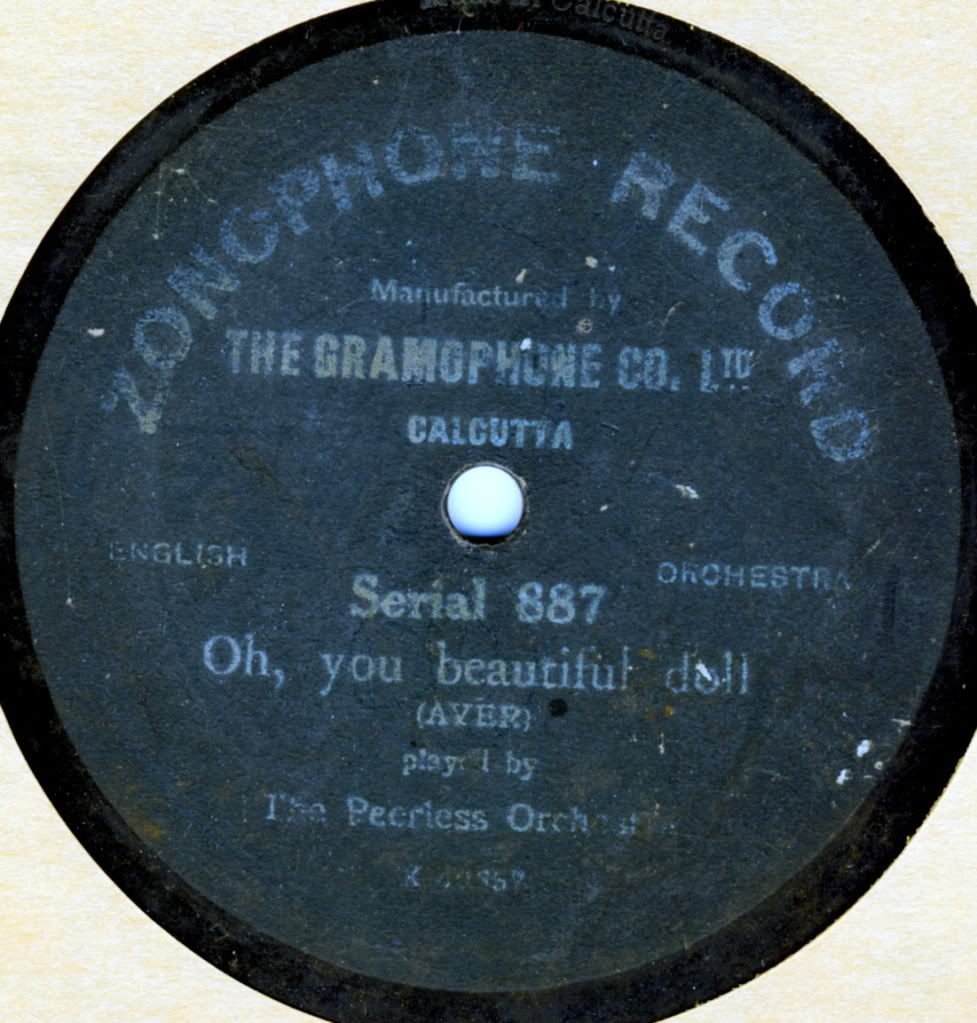
It ain’t Indian music…but it’s certainly evocative of a certain sort of nostalgia, and I will eventually get my entire library of 78s uploaded, so you should get used to some of this stuff now. There’s lots more where that came from.
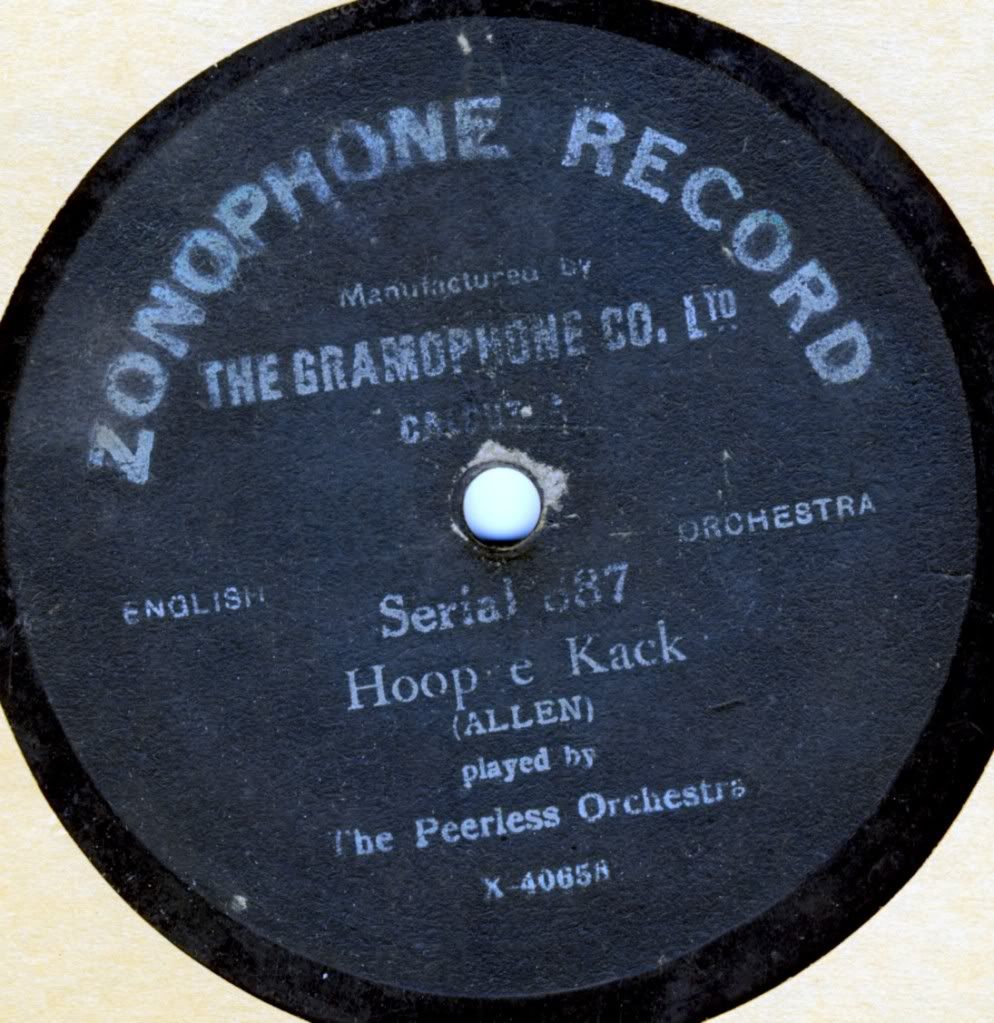
Enjoy.
Oh, You Beautiful Doll
Hoopoe Kack (WTF? SRSLY?)
Miami (A Southern Idyll)
The Horse Trot
India Indian music music: 78 rpm discs Hindi films
by Warren
3 comments
Meta
SiteMeter
Brighter Planet
78 rpm Records of Indian Music: Master Ibrahim (clarinet)
Once a good song came out in a popular movie, instrumental versions soon followed, often featuring the same orchestration that had been used in the original, with a clarinet, violin, harmonica, or piano substituted for the voice. One highly regarded “version tune” player was the clarinetist Master Ibrahim. Here he renders two songs from the 1943 film Poonji, both originally featuring the vocalist Shamshad Begum.
Ab koi tute hue dil ka sahara:
Gadiwale dupatta udaa jayaare:
Ruskin Bond was a fan of Master Ibrahim’s playing:
I was also fond of the clarinet (turj) playing of an Indian musician, Master Ibrahim, and I had some of his recordings which transported me back to the streets and bazaars of small-town India. Light, lilting and tuneful, I preferred this sort of flute music to the warblings of the more popular songsters.
India Indian music music vocalists: Quawwali Urdu
by Warren
4 comments
Meta
SiteMeter
Brighter Planet
78 rpm Records of Indian Music: Wahidanbai of Agra
In Quawwali performances, a song in praise of the Prophet Mohammed is known as a naat. Wahidanbai of Agra was also heard in Hindi film around this time; unless I’ve got the wrong artist, she was sometimes known as Wahidan Wasti.
Regardless, I enjoy these two naats for her fervent delivery and clear voice production. You will, too.
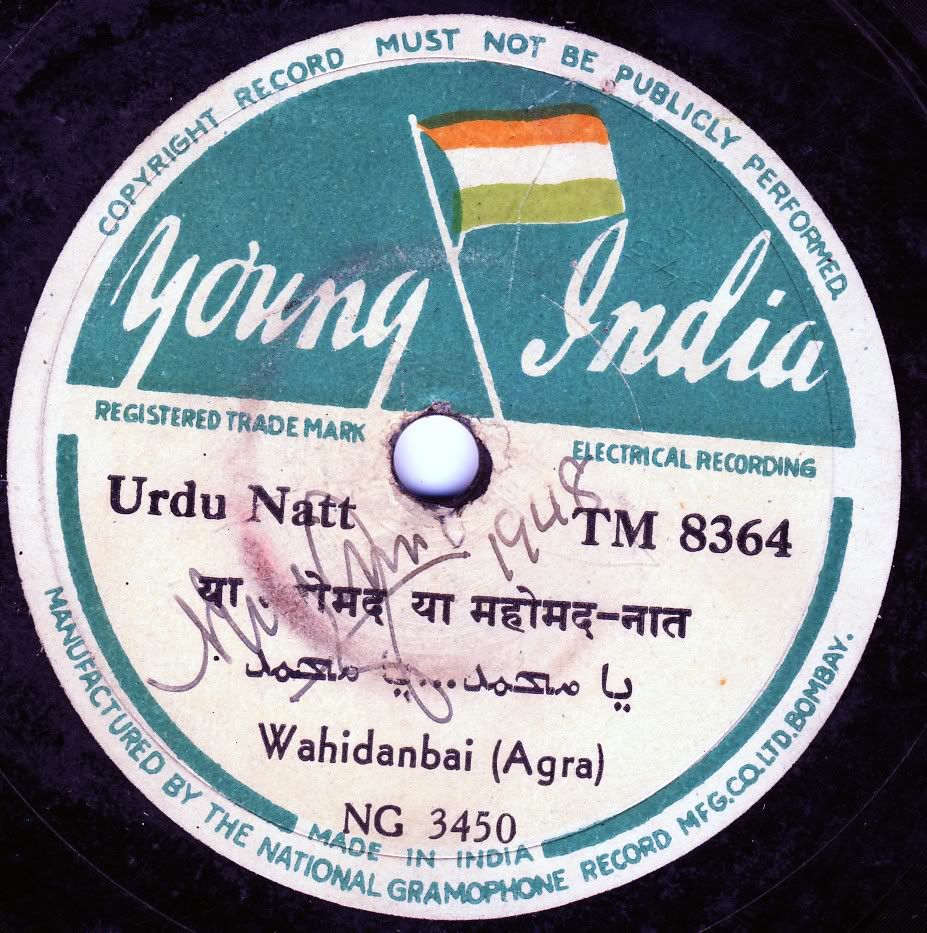
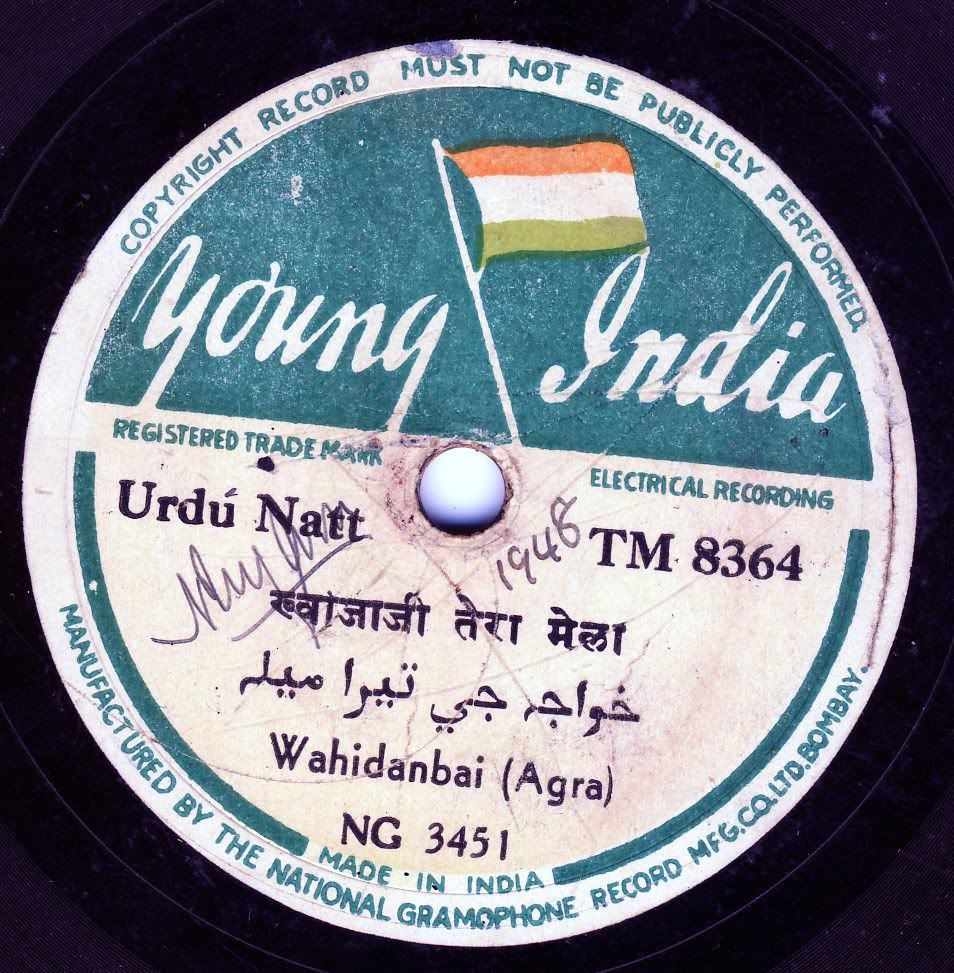
Ya Mohammed Ya Mohammed:
Khwaajaji tera mela:
The “Young India” record label was an attempt at indigenous music production:
During 1930-35, the British and German record manufacturing companies were well established and had a major share of disc manufacturing in India. The ‘Young India’ record label was an ‘indigenous’ effort at record production. The company issued over 10,000 songs on different subjects such as film music, classical music, folk music, publicity and educational material. Mainly amateur and upcoming artists have recorded on this label. The company ceased to function in 1955 so these recordings have never been reissued on audio tapes and CDs. Hence, it is important and relevant to preserve these invaluable recordings and the associated documents.
During 1935-55, the company produced over 10,000 titles on 78-rpm, 10 inch diameter shellac discs with two songs per disc. Each side could be played for over 3/3.5 minutes on spring wound gramophone machines. The recordings of film, popular, classical and folk music were issued. The repertoire covered music from different regions of India and sung in many different languages. During the long tenure of over twenty years, Indian citizens witnessed several important events such as the movement and struggle for freedom, Indian Independence in 1947, World War II and the beginning of the romantic period of independent India. This was also reflected in the records produced. Thus, there are speeches of great leaders, ballads, skits and dialogues on a number of subjects depicting changing social and political situations.

“Young India” records released many recordings of hortatory patriotic speeches. I wish I had a few of them in my collection, but these items are extremely rare.
India Indian music music vocalists: 78 rpm discs Indian folk music kutchi
by Warren
4 comments
Meta
SiteMeter
Brighter Planet
78 rpm Records of Indian Music: Kutchi Songs by Cassum Ranji
Many songs in Indian regional languages were recorded and released on 78 during the first half of the 20th century. Here’s a disc on the Zonophone label of a singer named Cassum Ranji, performing two songs in the Kutchi language. This means that even if I could figure out a single word from the recording, I wouldn’t have a clue. Appropriately enough, the labels, especially that of the B side, are almost unreadable.
“Dartro”:
Comic Song:
